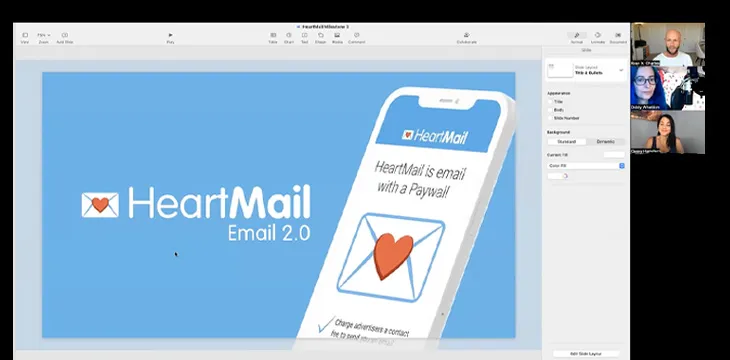|
Getting your Trinity Audio player ready...
|
https://www.youtube.com/watch?v=7oCqj_0suVE
How to solve the problem of Silicon Valley’s “Big Social”? Long-time Bitcoin entrepreneur and developer Ryan X. Charles says his new Heartmail service is one solution—based on the BSV blockchain, it places a price on opening new communications channels and enables full ownership of content. Charles announced that HeartMail account owners could register their paymail addresses for free, for a limited time.
HeartMail helps prevent spam and unsolicited messages and counters some of Big Social’s excesses. This group includes well-known names like Twitter, Facebook, YouTube, and LinkedIn, nearly always based in Silicon Valley.
“If they’re not in Silicon Valley they’re ideologically aligned with Silicon Valley,” Charles says in a new video series to showcase Heartmail’s benefits. “They dominate the social media platforms we use on the internet today. They’ve captured your attention which they sell to third parties, and they capture your attention, which they use to track consumers…they’ve been taking the internet in a wrong direction for several decades,” he added.
Charles developed HeartMail along with Casey Hamilton, with an interface designed by one of BSV’s most prominent creators, Diddy Wheldon.
‘Email 2.0’
With HeartMail, users can choose a price based on what they consider their attention to be worth. That goes both for advertising and personal messages. On top of that, your data remains yours forever and doesn’t belong to Big Social to sell to any third party they choose. That’s important for creatives who upload their work to platforms like YouTube. YouTube (or Google, its parent company) gets to curate which creators are allowed to make money and reserves the right to remove that permission on a whim. Many creators have learned this lesson the hard way, especially in the past few years.
By using Bitcoin, Charles says Big Social isn’t in the loop. Content and payments can be shared directly between websites, removing a particularly intrusive middleman.
HeartMail is essentially “email plus paymail.” The name itself also refers to Heartmail, the company, but its protocols are open for anyone to use, just like email. As well as extending the paymail protocol, it also extends email and web protocols by adding elements like invoicing and identity, among others.
You may choose to reveal your identity in a payment or not. For small purchases, it’s usually not necessary, but for larger ones people generally need to know who they’re transacting with.
Register Money Button paymails for free, for now
Money Button Paymails is HeartMail’s third “milestone.” Now, users can register Money Button paymail addresses for free for a limited time (as long as they already own those addresses). Signing up for a new HeartMail account costs US$10 at the moment, and registering a paymail will cost extra when HeartMail is ready to use. It’s possible to create multiple accounts, though each costs $10.
If you’re a HeartMail account owner, go to heartmail.com and log in (make sure you’re logged in to the Money Button account you used to sign up). It costs one cent to sign in, as Charles says recording a Bitcoin transaction is more secure than Money Button’s free swipes.
If your address is a valid Money Button paymail (e.g.: [email protected]), then that paymail name will also be valid for HeartMail so that you can enter [email protected] as a registered address. Your primary name for HeartMail will be the same as your Money Button name, meaning additional addresses will be aliases to that primary.
Charles warns users to register their names as soon as possible because if you don’t, someone else may register your name with HeartMail—if you don’t have an existing Money Button paymail with that name, it’s open for others to use.
In the future, HeartMail accounts will be transferable, meaning you can buy one for someone else and transfer ownership to them later. HeartMail also has an affiliate system, and if anyone uses your affiliate link to sign up, you’ll get 20% of that user’s HeartMail revenue (from HeartMail’s share, not the user’s) forever.
The new video series covers HeartMail’s milestones. The first two were the tipping button and inviting potential users to purchase early access. This third milestone is Money Button Paymails.
“There’s no one day when the product launches. We’re just going to iterate every week, every single day, as we work our way to the complete vision. That complete vision will take years to reach,” Charles says.
Watch: The BSV Global Blockchain Convention presentation, Making it easy for creators to earn – using BSV blockchain
https://www.youtube.com/watch?v=RzJsCRb6zt8&t=24464s

 07-05-2025
07-05-2025 





